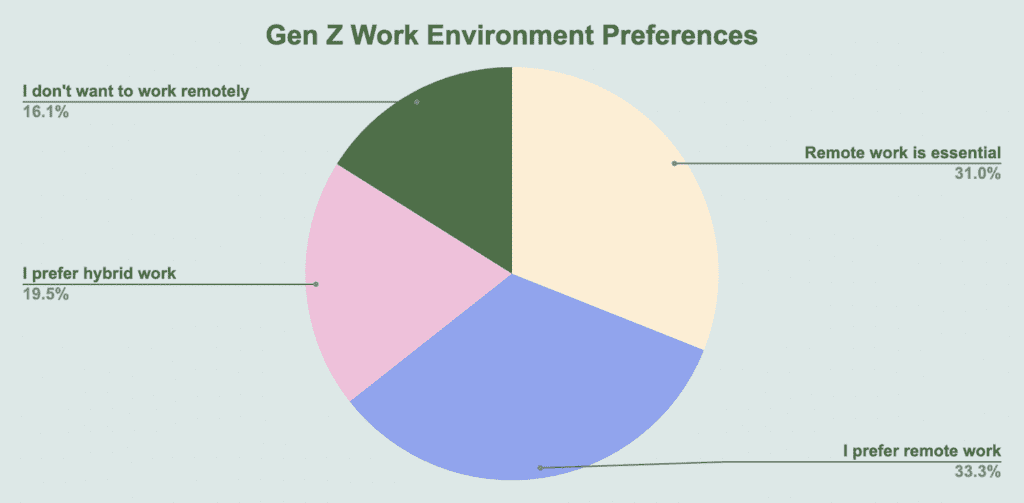Gen Z, people born between 1997 to 2012, will make up a third of the workforce by the end of the decade, according to the U.S. Bureau of Labor Statistics. And the 13% who are already in the workplace are making waves and breaking tradition. So, what’s Gen Z like in the workplace, and how are they different from the generations before? Here are some statistics on Gen Z that show what they’re really up to at work.
- Gen Z Salary Statistics
- Gen Z Diversity, Equity, and Inclusion Statistics
- Gen Z Work Environment Preference Statistics
- Gen Z Job-Hopping Statistics
- Gen Z Upskilling Statistics
Gen Z Wants a Good Salary — For a Reason
It’s not a stereotype that Gen Z cares a lot about salary. According to Handshake, 70% of Gen Zers put pay/salary as a top aspect they want from their next job.
Yet Gen Z isn’t just dreaming of big figures because they’re obsessed with money. Instead, they care about salary because they’re worried about the economy and their financial health. One in two members of the class of 2023 says current economic news has impacted their career prospects, according to Handshake’s 2023 Network Trends Report.
“They’re a really realistic generation,” Farah Mohiuddin, Forage customer success manager and early talent expert, says. “They grew up with a lot of economic uncertainty, and they’ve seen what millennials have gone through with the student debt crisis. They realize that they need to make money. They’re not talking about buying a house — they just want to survive.” (According to McKinsey, only 41% of Gen Zers expect to own a home one day.)
Other Gen Z Salary Statistics
- Gen Z says they need more money than other generations to feel financially secure.
- The median Gen Z salary is $33,800 per year, according to GOBankingRates.
- 65% of Gen Zers feel like they’re living paycheck to paycheck.
- 58% of Gen Z report they have two or more unmet social needs, such as “income, employment, education, food, housing, transportation, social support, and safety,” according to McKinsey.
Showcase new skills
Build the confidence and practical skills that employers are looking for with Forage’s free job simulations.
But They Want an Employer Who Cares About DEI, Too
Eighty-three percent of Gen Z candidates say that a company’s commitment to diversity, equity, and inclusion (DEI) is important when choosing an employer, according to Monster.
“They care a lot about the values of an organization,” Mohiuddin says. “They want them to walk the walk and not just say they care about diversity. They’re really holding employers accountable.”
It’s not just what the employer does but also who represents the company that matters.
According to a survey from Tallo, 69% of Gen Zers would be more likely to apply to a job with recruiters and materials that reflected an “ethnically and racially diverse” workforce. In addition, over half said they’d probably be more likely to apply to a role if the recruiter shared their ethnic or racial identity.
Other Gen Z DEI Statistics
- One in five Gen Zers says their own experience with inequality and discrimination has affected their career choices, according to the National Society of High School Scholars (NSHSS).
- Gen Z is the most ethnically and racially diverse generation yet. Just under half of Gen Zers identify as an ethnic or racial minority.
- 86% of Gen Z job seekers say they plan to participate in a company’s DEI or employee resource group (ERG) committee or contribute to a company’s DEI strategy, according to Tallo.
Gen Z Likes Working From Home, But Faces Remote Challenges
Gen Z tends to lean towards working from home — and one in five of them have never worked in person, according to Skynova. According to a study from GOBankingRates, over half of Gen Z likes remote work; 29% say they prefer to work remotely (the lowest of any generation), and 27% say remote working is a necessity (the highest of any generation).
On the other hand, 17% prefer hybrid, and 14% don’t want to work remotely at all.

Although a large percentage of Gen Z prefers remote work or considers it essential, making friends, networking, and finding a mentor are some of their biggest challenges. More than a fifth of Gen Zers (21%) report having no friends at work. Baby boomers were nearly twice as likely to say they make most of their friends at work, according to JobsSage.
And even if they like working from home, Gen Z wants in-person mentorship, according to the NSHSS: 63% said they’d prefer in-person training from their employers, while 13% prefer online.
Other Gen Z Work Environment Preference Statistics
- 70% of Gen Z say they’ll look for another job if their employer requires them to be in the office full-time, according to ADP.
- According to Harris Poll, more than half of Gen Zers (55%) feel like they’ve missed out on an important part of adulthood because of how the pandemic affected office culture.
- Gen Z is 77% more likely to click on a job opening that mentions “flexibility” than one that doesn’t, according to Axios.
Gen Z Isn’t Afraid of Job-Hopping
Gen Z is busting the old-school career myth that you have to “put in your time” at a job before changing to a new role.
While it’s normal for younger generations to job-hop more than their older counterparts, Gen Z’s job-hopping habits traverse industry norms. Three in four Gen Zers say they’re willing to switch career paths entirely, compared to less than half of people in older generations, according to LinkedIn. Their main reasons for job-hopping include: finding a position that better suits their interests or values, opportunities to get new skills, and better compensation.
Other Gen Z Job-Hopping Statistics
- Gen Zers are switching jobs at a rate 134% higher than before the pandemic in 2019, according to LinkedIn. Comparatively, millennials changed jobs 24% more, and boomers switched 4% less.
- Gen Z is more likely to work multiple jobs (25%) than the average professional (16%), according to McKinsey.
- Switching jobs paid off: Gen Z job-hoppers got nearly a 30% average raise from changing jobs in the last year, according to the Bank of America Institute.
But They’ll Stay In a Role If They Can Learn New Skills
One of Gen Z’s main reasons for job-hopping is to upskill in their next role: 67% of Gen Zers want to work at companies where they can learn skills to “advance their careers,” according to NSHSS.
Gen Z is ready and looking to learn, and they’re doing so in service of their career ambitions. They’re the generation most likely to say they want to upskill “if it helped me get another job internally, be promoted or get closer to reaching my career goals,” according to LinkedIn.
>>MORE: Gen Z can learn the skills they need to be workplace ready with Forage virtual experience programs.
Other Gen Z Upskilling Statistics:
- Gen Z spends 12% more of their time on LinkedIn Learning building their hard skills compared to the average person, according to LinkedIn’s Workplace Learning Report.
- Gen prefers mobile learning more than any other generation (LinkedIn).
- 76% of Gen Zers see upskilling as key to their career advancement (LinkedIn).
>>MORE: Learn what Gen Z’s saying in the workplace with 25 Phrases Gen Z Uses at Work.
Image credit: Canva


